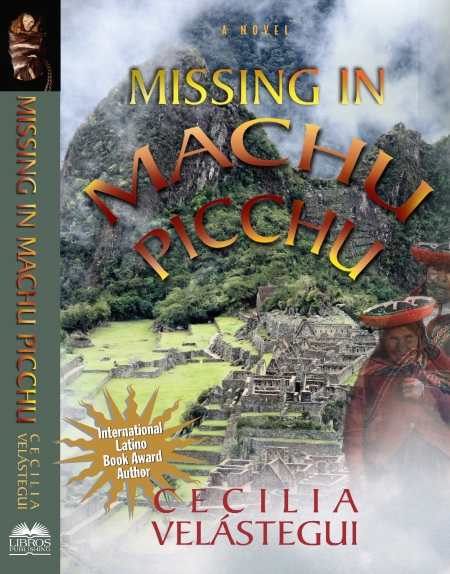Missing in Machu Picchu
“The women hikers stood on the narrow path, their weary backs resting against the cool rock face of the cliff. They caught their breath and allowed the revelation of their ultimate purpose to sink in: they were on nothing less than a quest for their very future; they were on a sacred pilgrimage for love.” As Cecilia Velástegui makes clear in her epic saga Missing in Machu Picchu, these delusional dames are unlikely to find true love: Owing to a series of mysterious coincidences, they are in the thrall of a lady-killer.
Rodrigo is a to-die-for, handsome megalomaniac posing as a tour guide; he has lured a flock of willing flirts to Peru, where he promises to take them on a perilous hike to Machu Picchu, the “city of the Incas” high in the Andes Mountains. Rodrigo has an eye for conquest, convinced he is an Incan god; the women—Gabby, Hilary, Tiffany, and Mercy—have come to break their addiction to Internet dating and find lasting love. Each of them secretly believes she will find it with Rodrigo, little suspecting how evil and corrupt he really is.
Behind the scenes, but in pursuit, are two old crones. Taki and Koyam go unnoticed as they sell their handmade crafts in the public square. With nearly a century and a half of wisdom between them, they know Rodrigo’s maleficent nature and are determined to keep him from working further harm. Taki, who is a “clairvoyant, healer, seer, shaman, priestess” plagued with dark visions about Rodrigo’s influence, is protected by her old friend Koyam as they dog the villain’s tracks. As the journey progresses, omens such as heavy rain plague the party; when they get farther from the known world of cybercafés and tourist dives, the gringas begin to realize just how isolated they are. Still ahead lie bloodlust, terror, death, and “one final soul-awaking experience.”
Velástegui, an International Latino Book Award author, has crafted this story like the mystical patterns of the shawls that Taki weaves. In her creation the author draws together threads of her own life. Born in the Andes Mountains of Ecuador, Velástegui was raised in California and France, speaks four languages, and stalks the globe in search of her stories.
Missing in Macu Picchu is more than a thriller. Velástegui wants her readers to not only be enchanted by this tale of seduction, vengeance, retribution, and, for one character at least, atonement, but also to be educated about Latin American culture and mythology: the legends, the history, and the classic clash between earthly desires and the will of the gods. She has included photographs of sacred Incan shrines, mute and eyeless mummies, and the recently discovered “ice maiden.” A lengthy bibliography and a study guide appear at the end of the book.
Velástegui’s prose is dreamlike and evokes comparisons with the best writers of modern magical realism. The simple lives of peasants and the complex schemes of city slickers reveal special meaning when drenched in the romance, violence, and pure zaniness of folk memory. Velástegui brings the genre up to date, with peasant grannies struggling to understand computers and identify with their clever but insensitive grandchildren, and college-educated women forced to do battle with ancient spirits and cosmic forces well beyond the reach of the worldwide web.
Reviewed by
Barbara Bamberger Scott
Disclosure: This article is not an endorsement, but a review. The publisher of this book provided free copies of the book and paid a small fee to have their book reviewed by a professional reviewer. Foreword Reviews and Clarion Reviews make no guarantee that the publisher will receive a positive review. Foreword Magazine, Inc. is disclosing this in accordance with the Federal Trade Commission’s 16 CFR, Part 255.

